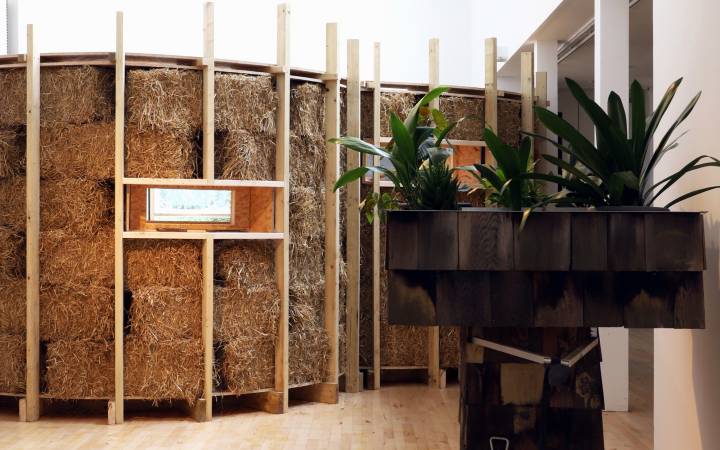East meets West in Kingston University fashion uprising
Posted Thursday 8 November 2012
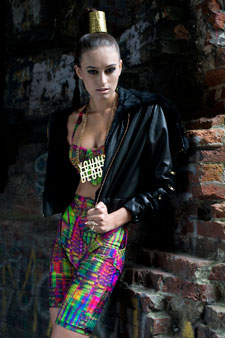 A young designer who was smuggled out of Iraq when she was just three years old has burst on to the London fashion scene. Inspired by the uprisings of the Arab Spring, Mayada Khammu from Kingston University has blended her Bedouin heritage with life in the English capital for an East meets West-themed womenswear collection.
A young designer who was smuggled out of Iraq when she was just three years old has burst on to the London fashion scene. Inspired by the uprisings of the Arab Spring, Mayada Khammu from Kingston University has blended her Bedouin heritage with life in the English capital for an East meets West-themed womenswear collection.
While a young Mayada spent her toddler years in Jordan, she was born and grew up in south west London. "We were visiting Iraq for a family wedding when the Gulf War broke out in 1990," the 24 year old recalled. "We had to be secreted out under cover of darkness for our safety. Talking to my family about this part of our lives years later got me thinking more about our journey from the Middle East to London."
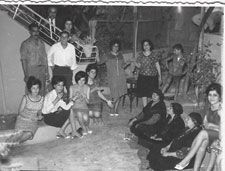 Mayada's Jordanian mother, Elham, had broken with tradition and moved to Egypt and the United States to study, while her part-Iraqi father, Ghassan, had taken up graphic design instead of a position in the army. Fascinated by their stories, Mayada started by flicking through family photo albums, where a snap capturing three generations of her relatives at the height of the swinging sixties caught her attention. "While some had beehive hairdos and miniskirts, others were dressed in traditional Bedouin attire," Mayada said. "The picture reminded me that fashion is always a mirror to society. I realised that, as a Jordanian fashion designer in London, I had the perfect opportunity to use my creativity to express my feelings about the changes taking place as a result of the Arab Spring."
Mayada's Jordanian mother, Elham, had broken with tradition and moved to Egypt and the United States to study, while her part-Iraqi father, Ghassan, had taken up graphic design instead of a position in the army. Fascinated by their stories, Mayada started by flicking through family photo albums, where a snap capturing three generations of her relatives at the height of the swinging sixties caught her attention. "While some had beehive hairdos and miniskirts, others were dressed in traditional Bedouin attire," Mayada said. "The picture reminded me that fashion is always a mirror to society. I realised that, as a Jordanian fashion designer in London, I had the perfect opportunity to use my creativity to express my feelings about the changes taking place as a result of the Arab Spring."
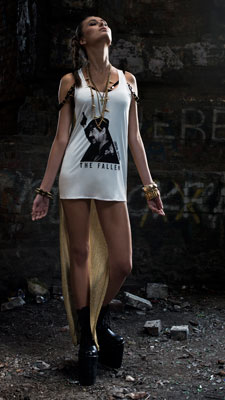 She set to work on a womenswear collection, called Young Blood, which contrasts the themes of heritage and modernity. Chunky jackets woven in a traditional Bedouin style mimic the shape of bomber jackets while brass crucifixes pile up against black latex, leather and PVC as an echo to the influence of hip hop and urban street culture. "The garish gold worn by these modern-day musicians is a parallel to the luxurious adornments worn as a sign of wealth by the Bedouin," Mayada explained. "Although very different, both brandish materialism as a statement of their position in society. Today in the West, the streets are our desert. This is the place where people wander in groups trying to assert their identity and this is where fashion unites and divides."
She set to work on a womenswear collection, called Young Blood, which contrasts the themes of heritage and modernity. Chunky jackets woven in a traditional Bedouin style mimic the shape of bomber jackets while brass crucifixes pile up against black latex, leather and PVC as an echo to the influence of hip hop and urban street culture. "The garish gold worn by these modern-day musicians is a parallel to the luxurious adornments worn as a sign of wealth by the Bedouin," Mayada explained. "Although very different, both brandish materialism as a statement of their position in society. Today in the West, the streets are our desert. This is the place where people wander in groups trying to assert their identity and this is where fashion unites and divides."
Acid-toned digital prints inspired by the vibrant interiors of Bedouin dwellings provide a lift to otherwise monotone colour. In other parts of the collection, images of fallen dictators feature on leggings and T-shirts. "Watching the changes taking place in the Middle East has been inspiring and heartbreaking at the same time. I used prints of Saddam Hussein and Colonel Gaddafi and entitled them 'The Fallen' because, one by one, these terrible figures built themselves up and, one by one, they have been overthrown by their people," Mayada said.
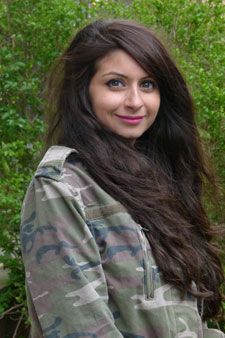 Although recent political upheaval forced her to postpone a trip back to Jordan to have some of her designs woven there, Mayada relished the chance to work with her mother to make the special frames needed to weave the jackets in the United Kingdom instead. Together, they spent four days weaving 16 metres of fabric for the design. She credits her mother with being a huge inspiration in her life and said her strength of character had an enormous bearing on her designs. "The women imagined in my collection throw away established norms of who a woman should be and what she should wear, just like my mother. They embrace feminity, but on their own terms," she said.
Although recent political upheaval forced her to postpone a trip back to Jordan to have some of her designs woven there, Mayada relished the chance to work with her mother to make the special frames needed to weave the jackets in the United Kingdom instead. Together, they spent four days weaving 16 metres of fabric for the design. She credits her mother with being a huge inspiration in her life and said her strength of character had an enormous bearing on her designs. "The women imagined in my collection throw away established norms of who a woman should be and what she should wear, just like my mother. They embrace feminity, but on their own terms," she said.
The young designer unveiled her womenswear collection at London Fashion Week's largest independent showcase, Vauxhall Fashion Scout, earlier in the autumn. Up and coming New York rapper Angel Haze has already been wearing some of her designs and Mayada now plans to continue basing herself in the capital to launch her own fashion label.
- Find out more about studying Fashion MA at Kingston University.
Contact us
General enquiries:
Journalists only:
- Communications team
Tel: +44 (0)20 8417 3034
Email us
